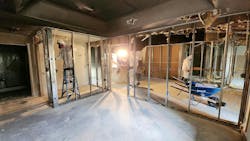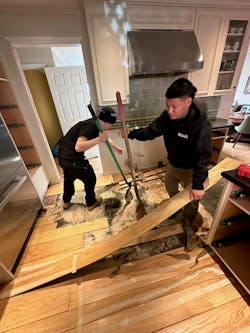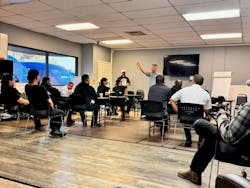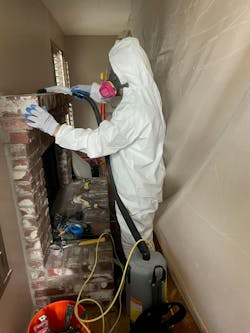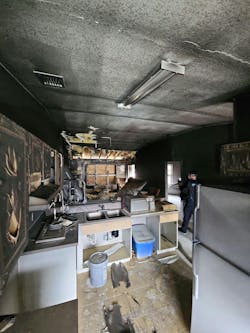Flooding, major water leaks and water damage from putting out a fire can wreak havoc on a home or business. Add the cost of remediation and restoration, and business owners’ and homeowners’ stress levels quickly rise.
“Even a little water can quickly cause major damage," the Federal Emergency Management Agency (FEMA) notes on its Floodsmart.com site. “Just one inch of water in a typical home can cause up to $25,000 of damage. Water can damage or destroy drywall, flooring, carpet, furniture, personal belongings and anything with electronics. If not removed quickly, it can cause dangerous mold and structural damage.”
Carpet and vinyl flooring can be thrown out, but wood floors are another matter.
“Moisture trapped within the wood creates an ideal environment for mold and mildew growth,” blogs DRYmedic Restoration Services. “Within 24 to 48 hours, mold spores can begin to colonize, posing health risks to residents and further compromising the structural integrity of the flooring. The presence of mold not only exacerbates the damage, but also leads to more serious and costly remediation efforts.”
In older homes, flaking lead paint and asbestos removal are concerns for residents and properly trained and certified remediation/restoration workers after a water-damage incident.
Would you like to add water remediation and restoration to your plumbing business? It seems like a natural progression for plumbers, who are water experts.
We talked to two Benjamin Franklin Plumbing franchisees who added water remediation/restoration through the DRYmedic Restoration Services franchise. Both franchises reside under the Authority Brands umbrella.
Prioritizing Customer Care
“As a Northern California native aware of the region’s challenging weather, I saw an opportunity to add a restoration company to my plumbing business,” explains John Rossi, franchise owner of Benjamin Franklin Plumbing of San Francisco Bay Area, DRYmedic Restoration Services of East Bay and North Bay, CA, and Mister Sparky Electric of North Bay, CA. “For the first three months of operation, I did no marketing, relying solely on leads from our Benjamin Franklin Plumbing plumbers—a testament to the power in having both of these companies in my business portfolio.”
He has nine team members across two locations (Concord and Novato, CA): three in-office and six field technicians.
It was a matter of reputation for Matt Black—franchise owner of Benjamin Franklin Plumbing of Port St. Lucie, FL, and DRYmedic Restoration Services of Treasure Coast, FL. He had recommended a local water remediation and restoration company to one of his plumbing customers.
"That customer returned and showed me a list of work he was billed for but the company never completed,” he recalls. “I didn’t want to take another hit to our reputation, so adding a DRYmedic franchise made sense.” Black has one mitigation director, two project managers and two demo techs for the franchise; his wife also is working with him.
Rossi notes that in-person training was held at DRYmedic Restoration Services’ new, state-of-the-art facility in Bloomfield Hills, MI, over two weeks: half in the classroom and half in the field. “Unlike other restoration companies, in-field training takes place on actual jobs within the community rather than staged projects or flood houses,” he says.
Dealing with customers looking at thousands of dollars worth of damage to homes and businesses requires empathy. Both men note that techs undergo soft-skills training to explain the process to customers, respectfully answer their questions and assure them that their homes or buildings will be clean and safe when the process is completed.
“Our technicians handle each project and property with the utmost care and attention to detail,” Rossi says. “We are taught to approach our work with empathy and understanding, recognizing the emotional toll disasters can take on homeowners and their families. Our technicians are very personable and prioritize customer care above all else.”
Focus on Health and Safety
Flood water is likely to contain chemical and biological contaminants that pose various health risks. A sewer backup with human waste is a biohazard. Mold and asbestos exposure can cause respiratory illnesses, even exacerbate existing conditions such as asthma.
Water remediation and restoration technicians must wear protective clothing to protect their health and safety. Contaminants, chemicals and debris can splash into eyes or damage hands.
“We conduct a thorough assessment of the extent and type of mold or hazardous material present,” Black notes. “Then we follow a detailed plan for removal, including containment measures and safety protocols we have in place. Technicians wear appropriate personal protection equipment such as respirators (N95 or higher for mold spores, and possibly more advanced for hazardous materials), gloves, goggles and coveralls to protect against chemical and biological exposure.”
Rossi adds: “We prioritize the health and safety of our technicians by having them fit-tested annually and holding weekly safety meetings. The topics of these meetings vary, ranging from how to safely enter a crawlspace to climbing and navigating roofs to properly tarp them.”
He also explains the importance of ensuring “a clean and sanitary environment when working in customers' homes or businesses." Both men say that identifying the water source(s)—a leaking pipe or fixture, drain pipe blockage, flood waters, etc.—and ensuring water can no longer damage the building is critical. Otherwise, the process starts again, adding unnecessary expense for owners.
“Thoroughly inspecting affected areas is crucial,” Rossi notes. “For this reason, we set up critical containment barriers to separate damaged parts of the property.”
DRYmedic technicians use state-of-the-art equipment and remediation protocols to clean, disinfect and repair any damage. The five steps to water restoration are:
1. Damage assessment
2. Water removal and extraction
3. Water damage cleanup and sanitizing
4. Dehumidifying and drying
5. Cleanup and approval
Adding Water Restoration Services
However, if you don’t have industry experience, Black notes that “going the franchise route is an easier way to get into the business as the franchise offers established processes/procedures, guidance and coaching to help in your success. It’s harder to start from scratch on your own. The hardest part for our team was getting used to the different software that is required: Dash, Xactimate and QuickBooks. It has been continual training.”
DRYmedic Restoration Services has a menu of services that franchisees can add to their businesses: water and flood damage, fire and smoke damage, mold remediation, storm damage, construction, residential restoration services, commercial restoration services, asbestos removal, disaster planning, sewer water backup, contents cleaning, disinfection, attic stain removal, emergency services and biohazard.
The Institute of Inspections Cleaning and Restoration Certification offers many required certifications for plumbing contractors who enter the business, including for water damage restoration technicians. “These standards serve to develop common, industry-accepted language and terminology that enables us to discuss concepts and procedures more universally regarding cleaning, inspections and restoration,” Black explains.
As part of Authority Brands, both franchises offer ongoing post-onboarding training sessions through the online training platform, Success Academy. Equipment manufacturers also provide training on their equipment to ensure proper use.
Contractors can rent equipment when they start their new water remediation/restoration venture, but Black and Rossi recommend buying the basic equipment and renting more equipment for larger jobs.
“Compared to independent contractors, many franchise owners can benefit from greater purchasing power due to the strong relationships franchisors maintain with suppliers,” Rossi adds.
Independent plumbing contractors interested in more detailed information on the water remediation/restoration industry can attend Flow Expo, the Kitchen and Bath Industry Show, PHCC and Service World Expo. Contractors who want to learn more about franchise options should look at the International Franchise Expo, the Multi-Unit Franchise Conference and the Leadership & Development Conference.
“Being part of a franchise can connect you with a large network of like-minded individuals,” Rossi says. “Whether you share a passion for the restoration or plumbing industries, have a background in entrepreneurship, or desire to help others in times of need, entrepreneurs within the network can offer advice, share experiences, answer questions and provide support as your business grows.”
Kelly Faloon is a contributing writer to CONTRACTOR magazine and principal of Faloon Editorial Services. The former editor of Plumbing & Mechanical magazine, she has more than 35 years of experience in B2B publishing, with 26 of those years writing about the plumbing, heating, cooling and piping industry. Faloon is a journalism graduate of Michigan State University. You can reach her at [email protected].
About the Author

Kelly L. Faloon
Freelance Writer/Editor
Kelly L. Faloon is a contributing editor and writer to CONTRACTOR, Contracting Business magazine and HPAC Engineering and principal of Faloon Editorial Services. The former editor of Plumbing & Mechanical magazine, Faloon has more than 26 years of experience in the plumbing and heating industry and more than 35 years in B2B publishing. She started a freelance writing and editing business in 2017, where she has a varied clientele.
Faloon spent 3 1/2 years at Supply House Times before joining the Plumbing & Mechanical staff in 2001. Previously, she spent nearly 10 years at CCH/Wolters Kluwer, a publishing firm specializing in business and tax law, where she wore many hats — proofreader, writer/editor for a daily tax publication, and Internal Revenue Code editor.
A native of Michigan’s northern Lower Peninsula, Faloon is a journalism graduate of Michigan State University. You can reach her at [email protected].
